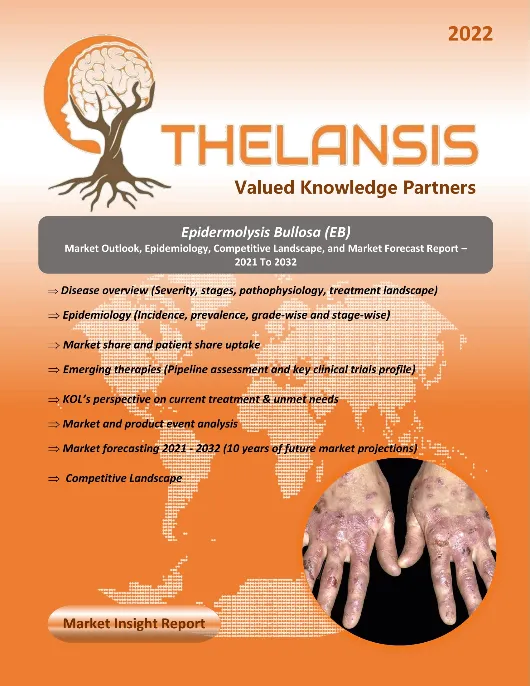Platinum-Resistant Advanced Ovarian Cancer – Market Outlook, Epidemiology, Competitive Landscape, and Market Forecast Report – 2024 To 2034
- Published Date : November 28, 2024
- Updated On : September 5, 2025
- Pages : 153
Platinum-Resistant Advanced Ovarian Cancer Market Outlook
Thelansis’s “Platinum-Resistant Advanced Ovarian Cancer Market Outlook, Epidemiology, Competitive Landscape, and Market Forecast Report – 2024 To 2034” covers disease overview, epidemiology, drug utilization, prescription share analysis, competitive landscape, clinical practice, regulatory landscape, patient share, market uptake, market forecast, and key market insights under the potential Platinum-Resistant Advanced Ovarian Cancer treatment modalities options for eight major markets (USA, Germany, France, Italy, Spain, UK, Japan, and China).
Platinum-Resistant Advanced Ovarian Cancer Overview
Platinum-Resistant Advanced Ovarian Cancer refers to a form of epithelial ovarian cancer that recurs within six months of completing platinum-based chemotherapy, indicating a diminished response to one of the most effective drug classes used in first-line treatment. This resistance is often driven by complex biological mechanisms, such as enhanced DNA repair, altered drug transport, and changes in the tumor microenvironment, which make subsequent therapies less effective. Patients generally present with abdominal bloating, pelvic pain, ascites, and fatigue, and disease monitoring relies on CA-125 levels and imaging studies. Once platinum resistance is confirmed, treatment shifts to non-platinum agents like liposomal doxorubicin, paclitaxel, or topotecan, though response rates are modest. Advances in molecular profiling have enabled the use of targeted therapies such as PARP inhibitors in BRCA-mutated tumors, anti-angiogenic agents like bevacizumab, and emerging antibody–drug conjugates that offer new therapeutic avenues.
Geography coverage:
G8 (United States, EU5 [France, Germany, Italy, Spain, U.K.], Japan, and China)
Insights driven by robust research, including:
- In-depth interviews with leading KOLs and payers
- Physician surveys
- RWE analysis for claims and EHR datasets
- Secondary research (e.g., peer-reviewed journal articles, third-party research databases)
Deliverables format and updates*:
- Detailed Report (PDF)
- Market Forecast Model (MS Excel-based automated dashboard)
- Epidemiology (MS Excel; interactive tool)
- Executive Insights (PowerPoint presentation)
- Others: regular updates, customizations, consultant support
*As per Thelansis’s policy, we ensure that we include all the recent updates before releasing the report content and market model.
Salient features of Market Forecast model:
- 10-year market forecast (2024–2034)
- Bottom-up patient-based market forecasts validated through the top-down sales methodology
- Covers clinically and commercially-relevant patient populations/ line of therapies
- Annualized drug-level sales and patient share projections
- Utilizes our proprietary Epilansis and Analog tool (e.g., drug uptake and erosion) datasets and conjoint analysis approach
- Detailed methodology/sources & assumptions
- Graphical and tabular outputs
- Users can customize the model based on requirements
Key business questions answered:
- How can drug development and lifecycle management strategies be optimized across G8 markets (US, EU5, Japan, and China)?
- How large is the patient population in terms of incidence, prevalence, segments, and those receiving drug treatments?
- What is the 10-year market outlook for sales and patient share?
- Which events will have the greatest impact on the market’s trajectory?
- What insights do interviewed experts provide on current and emerging treatments?
- Which pipeline products show the most promise, and what is their potential for launch and future positioning?
- What are the key unmet needs and KOL expectations for target profiles?
- What key regulatory and payer requirements must be met to secure drug approval and favorable market access?
- and more…
Platinum-Resistant Advanced Ovarian Cancer Market Outlook
Thelansis’s “Platinum-Resistant Advanced Ovarian Cancer Market Outlook, Epidemiology, Competitive Landscape, and Market Forecast Report – 2024 To 2034” covers disease overview, epidemiology, drug utilization, prescription share analysis, competitive landscape, clinical practice, regulatory landscape, patient share, market uptake, market forecast, and key market insights under the potential Platinum-Resistant Advanced Ovarian Cancer treatment modalities options for eight major markets (USA, Germany, France, Italy, Spain, UK, Japan, and China).
Platinum-Resistant Advanced Ovarian Cancer Overview
Platinum-Resistant Advanced Ovarian Cancer refers to a form of epithelial ovarian cancer that recurs within six months of completing platinum-based chemotherapy, indicating a diminished response to one of the most effective drug classes used in first-line treatment. This resistance is often driven by complex biological mechanisms, such as enhanced DNA repair, altered drug transport, and changes in the tumor microenvironment, which make subsequent therapies less effective. Patients generally present with abdominal bloating, pelvic pain, ascites, and fatigue, and disease monitoring relies on CA-125 levels and imaging studies. Once platinum resistance is confirmed, treatment shifts to non-platinum agents like liposomal doxorubicin, paclitaxel, or topotecan, though response rates are modest. Advances in molecular profiling have enabled the use of targeted therapies such as PARP inhibitors in BRCA-mutated tumors, anti-angiogenic agents like bevacizumab, and emerging antibody–drug conjugates that offer new therapeutic avenues.
Geography coverage:
G8 (United States, EU5 [France, Germany, Italy, Spain, U.K.], Japan, and China)
Insights driven by robust research, including:
- In-depth interviews with leading KOLs and payers
- Physician surveys
- RWE analysis for claims and EHR datasets
- Secondary research (e.g., peer-reviewed journal articles, third-party research databases)
Deliverables format and updates*:
- Detailed Report (PDF)
- Market Forecast Model (MS Excel-based automated dashboard)
- Epidemiology (MS Excel; interactive tool)
- Executive Insights (PowerPoint presentation)
- Others: regular updates, customizations, consultant support
*As per Thelansis’s policy, we ensure that we include all the recent updates before releasing the report content and market model.
Salient features of Market Forecast model:
- 10-year market forecast (2024–2034)
- Bottom-up patient-based market forecasts validated through the top-down sales methodology
- Covers clinically and commercially-relevant patient populations/ line of therapies
- Annualized drug-level sales and patient share projections
- Utilizes our proprietary Epilansis and Analog tool (e.g., drug uptake and erosion) datasets and conjoint analysis approach
- Detailed methodology/sources & assumptions
- Graphical and tabular outputs
- Users can customize the model based on requirements
Key business questions answered:
- How can drug development and lifecycle management strategies be optimized across G8 markets (US, EU5, Japan, and China)?
- How large is the patient population in terms of incidence, prevalence, segments, and those receiving drug treatments?
- What is the 10-year market outlook for sales and patient share?
- Which events will have the greatest impact on the market’s trajectory?
- What insights do interviewed experts provide on current and emerging treatments?
- Which pipeline products show the most promise, and what is their potential for launch and future positioning?
- What are the key unmet needs and KOL expectations for target profiles?
- What key regulatory and payer requirements must be met to secure drug approval and favorable market access?
- and more…
1. Key Findings and Analyst Commentary
- Key trends: market snapshots, SWOT analysis, commercial benefits and risk, etc..
2. Disease Context
- Disease definition, classification, etiology and pathophysiology, drug targets,etc.
3. Epidemiology
- Key takeaways
- Incidence / Prevalence
- Diagnosed and Drug-Treated populations
- Comorbidities
- Other relevant patient segments
4. Market Size and Forecast
- Key takeaways
- Market drivers and constraints
- Drug-class specific trends
- Country-specific trends
5. Competitive Landscape
- Current therapies
- Key takeaways
- Dx and Tx journey/algorithm
- Key current therapies – profiles and KOL insights
- Emerging therapies
- Key takeaways
- Notable late-phase emerging therapies – profiles, launch expectations, KOL insights
- Notable early-phase pipeline
6. Unmet Need and TPP Analysis
- Top unmet needs and future attainment by emerging therapies
- TPP analysis and KOL expectations
7. Regulatory and Reimbursement Environments (by country and payer insights)
8. Appendix (e.g., bibliography, methodology)
Table of contents (TOC)
1. Key Findings and Analyst Commentary
- Key trends: market snapshots, SWOT analysis, commercial benefits and risk, etc..
2. Disease Context
- Disease definition, classification, etiology and pathophysiology, drug targets,etc.
3. Epidemiology
- Key takeaways
- Incidence / Prevalence
- Diagnosed and Drug-Treated populations
- Comorbidities
- Other relevant patient segments
4. Market Size and Forecast
- Key takeaways
- Market drivers and constraints
- Drug-class specific trends
- Country-specific trends
5. Competitive Landscape
- Current therapies
- Key takeaways
- Dx and Tx journey/algorithm
- Key current therapies – profiles and KOL insights
- Emerging therapies
- Key takeaways
- Notable late-phase emerging therapies – profiles, launch expectations, KOL insights
- Notable early-phase pipeline
6. Unmet Need and TPP Analysis
- Top unmet needs and future attainment by emerging therapies
- TPP analysis and KOL expectations
7. Regulatory and Reimbursement Environments (by country and payer insights)
8. Appendix (e.g., bibliography, methodology)


